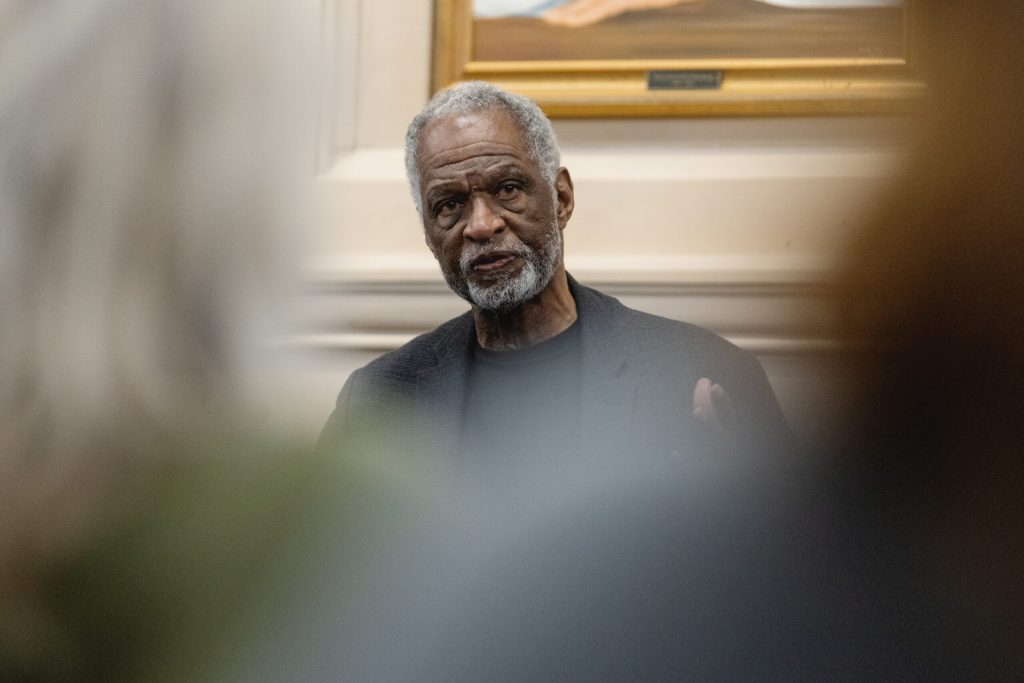Did 1991 State Law Give MPS Superintendent Too Much Power?
Former MPS Superintendent Howard Fuller, who pushed for law, says current leaders failed.

Former Milwaukee Public Schools Superintendent Howard Fuller at Marquette University in February 2024. Photo courtesy of Marquette University
Thirty years ago, Wisconsin law was changed to give financial oversight of Milwaukee Public Schools to the district superintendent.
Now, a state senator from Milwaukee says not having more checks and balances is what has led to the school district’s financial troubles.
A series of financial errors and missed deadlines have led to turmoil in the district. Milwaukee Public Schools Superintendent Keith Posley resigned earlier this month after mismanagement and financial failures were uncovered, leading to outraged residents calling for his ouster.
A corrective action plan submitted to the Department of Public Instruction has revealed an inexperienced and understaffed financial office and an outdated accounting system unable to manage the state’s largest school district.
DPI has said these errors have resulted in MPS being overpaid $35 to $50 million, which will have to be made up with budget cuts or taxpayer money.
Getting to the bottom of MPS troubles through paperwork
Those errors have led Gov. Tony Evers to call for audits of the district’s operations and instructional programs.
The school board and public have expressed support of both efforts.
Evers said it is important to begin the internal audits to quickly to fully identify the extent of the problems and work toward having future conversations about solutions.
But Sen. Chris Larson, D-Milwaukee, said getting to the bottom of what happened in MPS will also be found going through the history of legislative efforts to change the way the district operated.
According to state statutes, until the early 1990, Milwaukee Public Schools was required to have a board “secretary-business manager,” to keep a record and full account of all receipts and expenditures.
All other school districts must have members of the school board serve as a clerk or treasurer.
In practice, the MPS secretary-business manager was in charge of the administration of district business operations, while the superintendent was in charge of educational operations.
Documents from the Legislative Reference Bureau from the early 1990s show then Superintendent Howard Fuller pushed to remove the position of secretary-business manager of the board from MPS.
In 1991, Wisconsin Act 39 eliminated the secretary-business manager position. The only remaining aspect of that statute allows MPS to employ a business manager who does not need a DPI-issued license, according to the Legislative Reference Bureau.
In spring 1992, the MPS board adopted a plan to completely eliminate the position and reallocate its functions under the superintendent.
“It took 30 years to get to this point, but it was inevitable that shifting away the financial management oversight from the school board and putting it all under the superintendent along with instructional duties was, by design, meant to keep it in the dark,” Larson said. “Not just on this, but all kinds of things over the last three decades.”
Howard Fuller says the problem is the current administration
Fuller, who pushed for the legislative change in financial oversight during his tenure as superintendent, said that change was necessary for the district to function properly. And he said the problems MPS is currently facing are a result of Posley’s leadership and the current school board.
Fuller served as superintendent of MPS from May 1991 until April 1995. He is regarded by some as one of the district’s best leaders.
He is also known as one of the fathers of Milwaukee’s Voucher program.
He said when he arrived in the district, the secretary-business manager was in charge of the people and the money. He was in charge of education.
To Fuller, that didn’t make any sense.
“The only way I could be in charge of education was to be in charge of the people and the money,” Fuller said. “So what I did was get a statutory change to put all of that responsibility under the superintendent. I felt like I was where the buck stopped. So you could do a lot of finger pointing, but if something went wrong, it was my responsibility as a superintendent.”
Fuller said there should be absolute clarity in a school district from a superintendent to a school board.
But the school board should be asking the right questions.
When he retired from MPS, Fuller blamed the union and the school board for blocking his efforts to make innovative changes in the district.
One of his proposals was to create schools that could hire non-union staff, eliminate tenure for teachers and contract with private companies to run schools.
After leaving MPS, Fuller founded the Institute for the Transformation of Learning at Marquette University. He retired from that position in 2020, but is still active in a Milwaukee charter school that bears his name.
While Fuller argues that superintendents need control over district’s money, Larson said every unit of government has an independent group looking at finances — in the state, there is the Legislative Fiscal Bureau.
“We are finding out more and more that the finance people were telling the school board that everything was fine,” Larson said. “And all that the school board could do nod because they didn’t have an independent financial officer and they didn’t even have their own independent staff.”
With Posley’s resignation, the district is now in the hands of an interim superintendent. Many of the posts in the district’s finance department are now empty.
MPS Chief Financial Officer Martha Kreitzman retired immediately after Posley resigned. Comptroller Alfredo Balmaseda was fired the next day.
A DPI report shows 12 open positions in the MPS financial office.
Did a 30-year-old law change give the Milwaukee school superintendent too much power? was originally published by Wisconsin Public Radio.
If you think stories like this are important, become a member of Urban Milwaukee and help support real, independent journalism. Plus you get some cool added benefits.





















Fuller… consolidation of powers, and other “innovative” changes like a bunch of anti-union stuff… gross. No wonder why MPS was screwed up. It’s his fault and then he points the finger at everyone else. There’s a reason the system worked and had the oversight that it did, he was against all of that. And also for-charter schools, again had vested interest to make MPS backfire / be weakened. Truly disgusting. What a lame puff piece for Fuller.
“Fuller served as superintendent of MPS from May 1991 until April 1995. He is regarded by some as one of the district’s best leaders.”
Really? By who? Fuller couldn’t get his way, so he quit after a short tenure and then sought to undermine MPS at every turn. There have been MANY Choice/Voucher school scandals and failures over the years that Fuller should be given credit (blame) for. Looking beyond Fuller’s incessant anti-MPS rhetoric, he can be seen as the failed educational reformer he truly is.
Let’s look at MPS as a corporation for a minute. Imagine any company of this size where the CEO (superintendent) is “in charge” of everything. I wonder how long this corporation would be in business?
Oh, wait! There’s always taxes that can be increased to cover the inadequacy, ineptitude and arrogance of the CEO (superintendent) when it comes to MPS. Tax increases, rather than accountability, seem to be the way out of the woods for far too many people closely involved in this scheme.
Howard Fuller administrative career included head of the Wisconsin Employment Relations Commission, MATC, the former Milwaukee County Department of Human Services, and MPS. I have yet to read about any “innovation” that he brought about in any of these positions. His pattern is to talk about reform, do nothing, blame the entity for not going with what his agenda was, and leave after a few years. He still charms the conservative philanthropic community like Northwester Mutual even though he has never had a record of “transformation” in the Milwaukee educational community. Privatizing public education has always been a priority of his rich conservative supporters.
Perhaps Ms. Hess could provide us with the names of those who think Fuller was one of our “best superintendents”? No one that I know in the educational community. Sen. Larson got it right, but that won’t help MPS now. The vultures are circling (again). Well-known suburban MPS-hater Kooyenga, now on the corporate teat, leads the choir, with cranky ol’ Tommy T. Taking a solo. Sheesh……